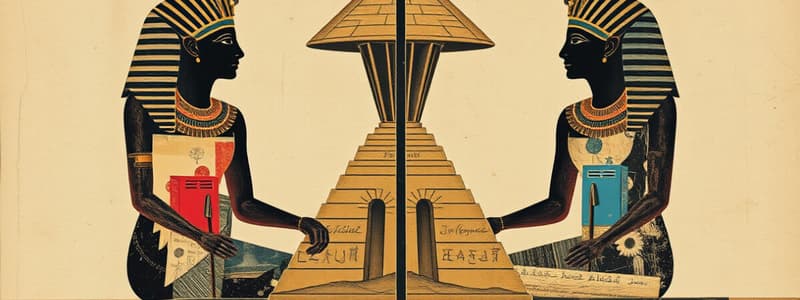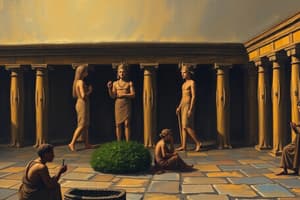Podcast
Questions and Answers
Why was ancient Egyptian society structured like a pyramid?
Why was ancient Egyptian society structured like a pyramid?
Egypt's society was structured like a pyramid because it had different levels, the lower levels of a pyramid were bigger and the upper levels were smaller, much like the different social classes.
How did religion affect the organization of the social pyramid?
How did religion affect the organization of the social pyramid?
Since religion affected everybody's daily lives, the priests became more powerful as they overlooked religion.
In what ways did Egyptian women enjoy more freedom and rights than most women in the ancient world?
In what ways did Egyptian women enjoy more freedom and rights than most women in the ancient world?
Egyptian women were able to own land, run businesses, divorce, etc.
Why was the social pyramid in ancient Egypt rigid?
Why was the social pyramid in ancient Egypt rigid?
What were the three important officials and how did they help the pharaoh?
What were the three important officials and how did they help the pharaoh?
How did the status of government officials affect the daily lives of people in this social class?
How did the status of government officials affect the daily lives of people in this social class?
What were the four different priests?
What were the four different priests?
What did the four different priests do?
What did the four different priests do?
How did the status of priests affect the daily lives of people in this social class?
How did the status of priests affect the daily lives of people in this social class?
What were scribes and what did they have to do to become one?
What were scribes and what did they have to do to become one?
How did the status of scribes affect the daily lives of people in this social class?
How did the status of scribes affect the daily lives of people in this social class?
What are artisans and what crafts did they specialize in?
What are artisans and what crafts did they specialize in?
How did the status of artisans affect the daily lives of people in this social class?
How did the status of artisans affect the daily lives of people in this social class?
What did the peasants do and how did the seasons affect their work?
What did the peasants do and how did the seasons affect their work?
How did the status of peasants affect the daily lives of people in this social class?
How did the status of peasants affect the daily lives of people in this social class?
Flashcards are hidden until you start studying
Study Notes
Social Structure of Ancient Egypt
- Ancient Egyptian society resembled a pyramid, with a broad base representing a large population of lower social classes, tapering to a small elite at the top.
- The rigidity of the social pyramid hindered social mobility; individuals had limited opportunities to change their social status.
Religion's Role
- Religion significantly influenced daily life, enhancing the power of priests who managed spiritual practices and ceremonies.
- Priests occupied important positions within the social hierarchy, directly affecting their status and influence in society.
Rights of Women
- Egyptian women enjoyed rights uncommon in the ancient world, including ownership of property, business operation, and the ability to initiate divorce.
- Their legal rights contributed to a higher degree of gender equality compared to other ancient civilizations.
Key Officials
- Three crucial officials in government were the vizier, chief treasurer, and general of the armies.
- The vizier served as the pharaoh's chief advisor and judge.
- The chief treasurer managed the wealth of the government.
- The general oversaw military affairs and strategized in warfare.
Daily Lives of Government Officials
- The status of government officials directly influenced their living conditions, luxury, and overall happiness.
- Higher officials enjoyed banquets and a more affluent lifestyle compared to those of lower status.
Role of Priests
- The four types of priests included the High Priest, Temple Priest, priestesses, and regular priests.
- High Priests oversaw religious activities and provided counsel to the pharaoh.
- Temple Priests managed temple operations while other priests addressed communal spiritual needs.
Status of Priests
- The status among priests determined their roles; higher-ranking priests held significant authority and visibility.
- Regular priests focused on local affairs, while high-ranking priests had greater influence over national religious matters.
Scribes in Society
- Scribes were critical record keepers, documenting agricultural production, census data, and administrative records.
- Attending specialized scribe school was essential for their advancement, providing a rare opportunity to rise in social status.
Daily Lives of Scribes
- Scribes' status influenced their employers and wages; those working for priests or nobles earned higher compensation than those serving the government.
Artisans and Their Crafts
- Artisans were skilled laborers responsible for creating exquisite art and goods, including sculptures, jewelry, and pottery.
- Despite their contributions, they often received minimal recognition for their work within society.
Status of Artisans
- Artisan status determined levels of recognition and appreciation; higher-status artisans enjoyed greater acknowledgment and respect.
Role of Peasants
- Peasants formed the largest and lowest class in Ancient Egypt, essential for agriculture and large construction projects like monuments.
- Their labor was affected by the annual flooding of the Nile, which determined the agricultural cycle with three seasons: Flooding, Planting, and Harvesting.
Daily Lives of Peasants
- The social standing of peasants influenced their harvest rewards; those with higher status received better compensation for their work compared to lower-status peasants.
Studying That Suits You
Use AI to generate personalized quizzes and flashcards to suit your learning preferences.




